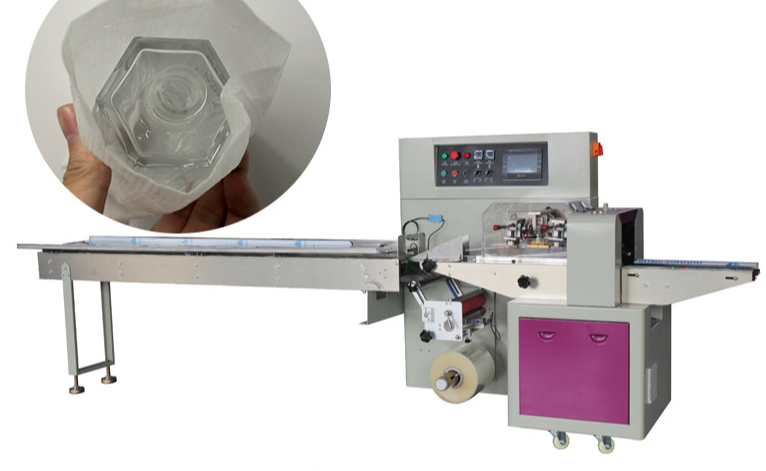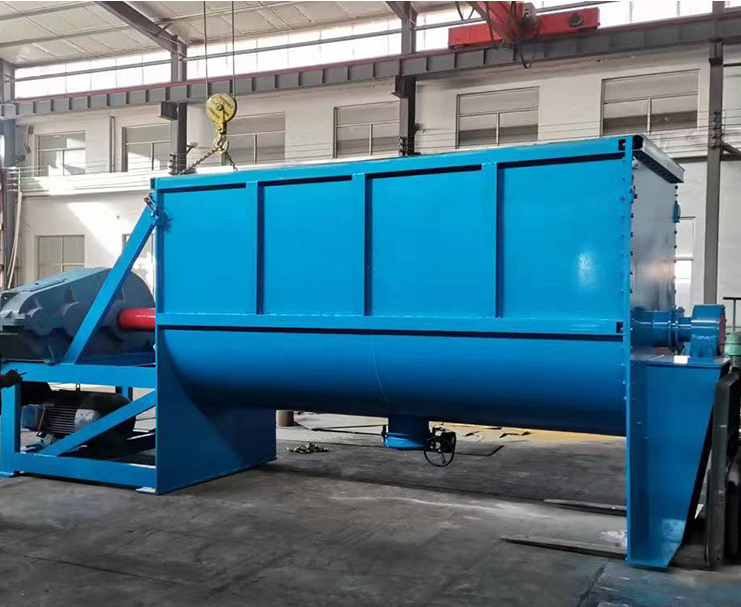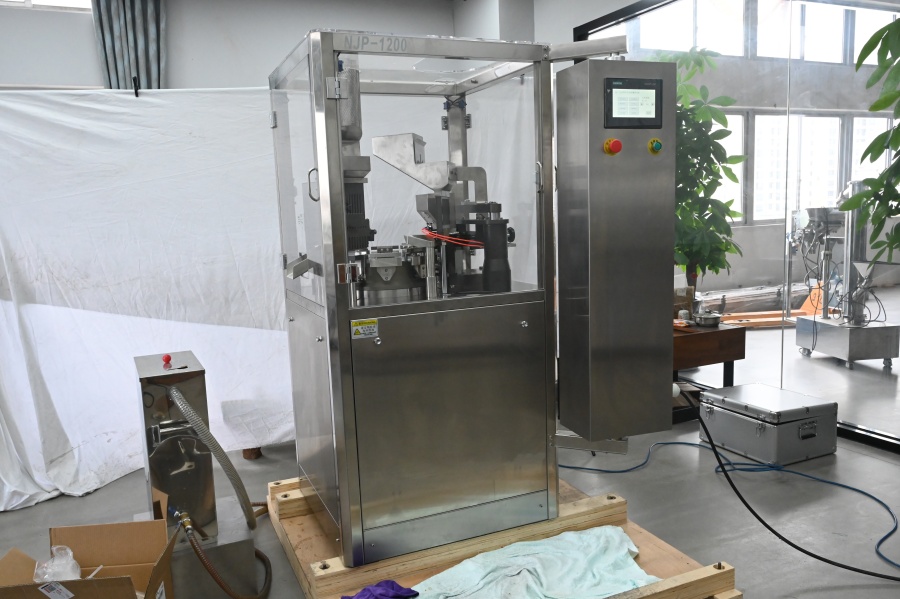Going green is no longer just a trend. Customers now want brands to care about the environment. But making biodegradable packaging by hand is slow, messy, and sometimes expensive.
This is where a biodegradable packaging machine can help. It’s a device that makes it easy to produce packaging that is recyclable, biodegradable, or made from renewable materials.
These machines work faster than manual methods and reduce waste. Plus, they help brands keep their products safe and looking professional.
Want to know more? Keep reading as we’ll break down exactly what a biodegradable packaging machine is and why it matters.
What Is a Biodegradable Packaging Machine?

A biodegradable packaging machine is a piece of pharmaceutical equipment that helps brands create packaging using materials that naturally break down. These include plant-based films, compostable plastics (PLA/PBAT), kraft paper, or starch-based wraps.
Unlike regular plastic packaging machines, this machine is engineered to handle biodegradable materials without melting, tearing, or jamming.
The machine takes raw materials, like compostable plastics, and turns them into ready-to-use packaging. It can fold boxes, fill bags, seal containers, or even print labels, all while keeping waste low.
Data shows that around 71% of consumers now prefer products with sustainable packaging. This makes biodegradable packaging a must-have for companies that want to win in this eco-conscious era.
Key Industries and Their Applications
1. Food and Beverage Industry (Largest Application)
This sector is the primary driver due to high volumes of single-use packaging and strong consumer demand for sustainability.
Fresh Produce: Bagging for fruits, vegetables, and salads using biodegradable films.
Bakery & Confectionery: Wrapping for bread, pastries, cookies, and candy bars.
Snack Foods: Pouches for chips, nuts, and pretzels.
Food Service: Takeaway containers, clamshells, cups, and lids for restaurants and cafes.
Coffee & Tea: Compostable coffee pods (K-Cups), tea bags, and bag-in-box liners.
2. E-commerce and Logistics
The explosion of online shopping has created a massive need for protective and sustainable packaging.
Void Fill: Machines that produce and dispense biodegradable loose-fill peanuts (e.g., from starch) or crumpled paper.
Padded Mailers: Form-fill-seal machines that create mailers with cushioning made from recycled paper or biodegradable bubble wrap alternatives.
Protective Wraps: Wraping items in biodegradable tissue or cornstarch-based films.
3. Personal Care and Cosmetics
Brands in this space use sustainable packaging to align with their “natural,” “clean,” and “eco-friendly” brand image.
Shampoo & Conditioner: Bottles and pouches made from bio-PET or PLA.
Soap Bars: Compostable wrappers and cardboard boxes.
Cosmetics: Tubes for creams, lipstick casings, and compacts made from biodegradable composites.
Cotton Swabs & Pads: Packaging for products that are themselves biodegradable.
4. Healthcare and Pharmaceuticals (A Growing Niche)
While subject to strict regulations, there is a push for sustainability in non-sterile, external applications.
Blister Packs: For tablets and capsules using biodegradable films (a complex but emerging area).
Secondary Packaging: Cardboard cartons and paper-based instruction leaflets.
Medical Device Packaging: For single-use, non-critical devices where sterility can be maintained with biodegradable materials.
5. Agriculture and Horticulture
A natural fit, as the end-life of the packaging often aligns with the organic waste stream.
Seed Packets: Made from paper or compostable films.
Fertilizer & Soil Bags: Large sacks made from biodegradable plastics or woven natural fibers.
Pot and Tray Packaging: Films used to wrap and protect plant seedlings.
What Makes a Packaging Machine Biodegradable?
When people hear the term “biodegradable machine,” it can sound complicated. But in reality, it just means the machine is designed to help businesses pack their products in ways that use less energy, generate less waste, and support green materials.
These machines often use advanced motors and technology that consume less power, which lowers both electricity bills and carbon footprint.
According to the International Energy Agency, improving energy efficiency could deliver more than 40% of the emissions cuts needed by 2040, so this step makes a huge difference.
Another key feature is material compatibility. Regular packaging machines are usually designed for plastics. Biodegradable ones, however, are built to handle biodegradable films, recyclable cardboard, or compostable wraps without issues.

Key Features of Biodegradable Packaging Machines
Do you know consumers are willing to pay 9.7% more for goods produced and packaged sustainably? That’s a big push for businesses to invest in biodegradable packaging machines. The key features of these machines include:
1. Energy-Efficient Operation
Traditional packaging machines can use up a lot of electricity, which adds to costs and carbon emissions.
Biodegradable versions are designed to consume less power without reducing performance. This means lower bills for companies and a smaller environmental footprint at the same time.
2. Compatibility with Biodegradable and Recyclable Materials
One of the biggest shifts in packaging today is the move from plastics to materials like paper, compostable wraps, and recyclable cardboard.
Biodegradable packaging machines are built to handle these newer materials with ease. This gives brands flexibility to choose options that align with consumer demand for sustainable packaging.
3. Reduced Waste During Production
Every time packaging is made, there’s usually some leftover scrap. Older machines can create a lot of waste, but modern, biodegradable machines are much smarter.
They cut and shape materials more accurately, which reduces waste and makes the process more cost-efficient, too. Less waste means more savings and less trash.
4. Flexibility for Different Packaging Types
Biodegradable packaging machines are not one-size-fits-all. They can be adjusted to work with different types of packaging, such as bottles, boxes, and wraps.
This flexibility is important for brands that offer multiple products. Instead of buying several machines, one biodegradable system can often handle it all.
Benefits of Biodegradable Packaging Machines for Green Brands

Biodegradable packaging machines are changing the way companies think about both the planet and their bottom line. They’re not just “green tools” but also smart business investments. Let’s explore the main benefits in detail.
1. Stronger Brand Image
Using biodegradable machines helps brands show they truly care about the environment. This builds a positive image with customers who value sustainability.
78% of consumers now say that a sustainable lifestyle is more important, and they actively prefer eco-conscious brands. For a company, that means investing in green packaging can directly attract more loyal buyers.
2. Long-Term Cost Savings
These machines are built to use less energy and reduce packaging waste. Even though the upfront cost can be higher, businesses save money in the long run. For example, machines that minimize material waste can cut packaging costs significantly.
3. Compliance with Regulations
Governments worldwide are pushing for less plastic and more recyclable materials. By switching early to biodegradable packaging machines, businesses can avoid sudden fines or expensive last-minute changes by following GMP standards and other requirements.
For instance, the EU’s single-use plastics directive has already banned certain packaging forms, and similar laws are growing globally. Companies that adopt eco-machines now stay ahead and stress-free.
4. Better Customer Loyalty
Shoppers are not just buying products, they’re buying values. In fact, Gen Z prefers to buy from sustainable brands.
This shows that using biodegradable packaging directly boosts customer trust and loyalty. When customers know a brand is doing its part, they’re more likely to come back and recommend it to others.
Real-World Applications of Biodegradable Packaging Machines
Here’s where biodegradable packaging machines make the biggest impact:
1. Food and Beverage Packaging
Food packaging needs to be safe, fresh, and reliable. Biodegradable machines allow companies to use recyclable wraps, compostable trays, or biodegradable bottles. For example, juice brands can now switch to plant-based bottles instead of plastic ones.
2. Cosmetics and Personal Care
Cosmetics often come in small bottles, jars, and boxes, which can create a lot of waste. Biodegradable packaging machines help brands use recyclable materials, such as paper-based wraps or refillable containers. Imagine buying shampoo in a container you can return or reuse.
3. Pharmaceuticals
Medical packaging must be clean, safe, and tamper-proof. Biodegradable machines allow drug companies to create packaging that protects the medicine while using less harmful materials. Instead of hard-to-recycle plastic packs, companies can use biodegradable blister packs or recyclable cartons.
4. E-Commerce and Shipping Industries
The online shopping industry is booming, and with it comes a huge amount of packaging waste. Biodegradable packaging machines enable the production of recyclable boxes and paper-based bubble wrap. This helps reduce the mountain of plastic that usually comes with shipping.
FAQs
1. Are biodegradable packaging machines more expensive than regular ones?
Yes, the initial cost can be slightly higher because of the advanced technology. But in the long run, they save money by reducing energy use, minimizing waste, and cutting disposal costs. Many businesses also gain customer loyalty, which boosts sales and offsets the investment.
2. Do biodegradable packaging machines slow down production?
Not at all. In fact, many are faster and more efficient because they use newer technology. Some fully automated models can handle high-speed production lines without sacrificing quality. Instead of slowing things down, they often make the entire process smoother and more consistent.
Take the First Step Toward Greener Packaging
If you’ve been wondering what a biodegradable packaging machine is, the answer is simple: it’s a smarter, cleaner, and more future-ready solution. With the rise of eco-conscious consumers, switching to sustainable packaging is a must.
This is where Finetech jumps in.
We help businesses find packaging machines that balance performance, cost savings, and sustainability. Whether you run a small business or manage large-scale operations, our solutions are designed to keep you ahead in the green shift.
Contact Finetech today and build a packaging system that works better for your business and the planet!




